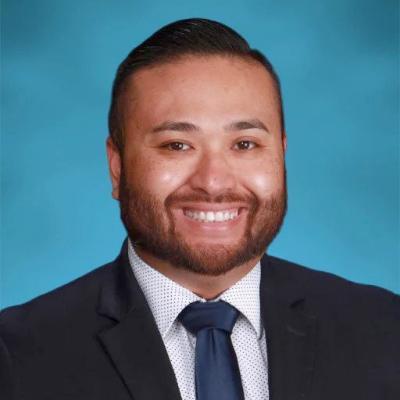
Christopher Aquino is the vice principal of Curriculum and Instruction at St. Paul High School.
Christopher’s role oversees school operations, which includes designing, implementing, and evaluating the school's curriculum. Using standardized test scores and classroom data, he analyzes student data to identify areas of strength and areas that need improvement. He collaborates with other school leaders to develop and implement student support services such as counseling, special education, and English Language Learner programs. He aims to create a positive school culture and engage with the community to promote student success. In addition, he is the Diversity, Equity, and Inclusion Committee Chair, Advanced Placement Coordinator, moderator for the National Honor Society, California Scholastic Federation, and the school’s Ambassadors.
The LMU Ed.D. Program appealed to Christopher because of its focus on social justice, specifically how education can be used to promote social justice and establish a level playing field for all students. He wanted to learn how to scrutinize intricate educational issues, create and enforce policies that work, and lead teams to initiate constructive changes. Obtaining an Ed.D. enabled him to develop the vital leadership skills needed for working in diverse educational settings as well as showing him how to harness his passion for social justice to positively impact students' lives.
Christopher’s research was on one school's experience during the COVID-19 pandemic. The qualitative study aimed to capture the participants' lived experiences and the various phenomena they encountered, such as remote learning and social distancing. The study used in-depth interviews to gather data on the participants' experiences, perceptions, and resilience. The data analysis focused on identifying the key themes, including their challenges, support systems, coping strategies, and lessons learned. The study's findings provide insights into how schools can better support their community during future crises and adapt their practices to ensure that students continue receiving high-quality education during disruption.
Christopher’s experience in LMU’s Ed.D. Program significantly impacted his personal and professional development. First, it deepened his knowledge and expertise in specific areas of education, while developing critical leadership and analytical skills through a social justice lens. Even though his coursework was mainly online over Zoom, LMU's focus on collaboration and networking provided opportunities to build connections with other education professionals, fostering a professional learning community. The program helped him to become more effective as a leader, benefitting his students, colleagues, and communities. Finally, the program’s emphasis on research helped him to become a better writer and researcher.